牛津上海版英语八年级上册 Unit3 Trouble! 讲义
文档属性
| 名称 | 牛津上海版英语八年级上册 Unit3 Trouble! 讲义 |
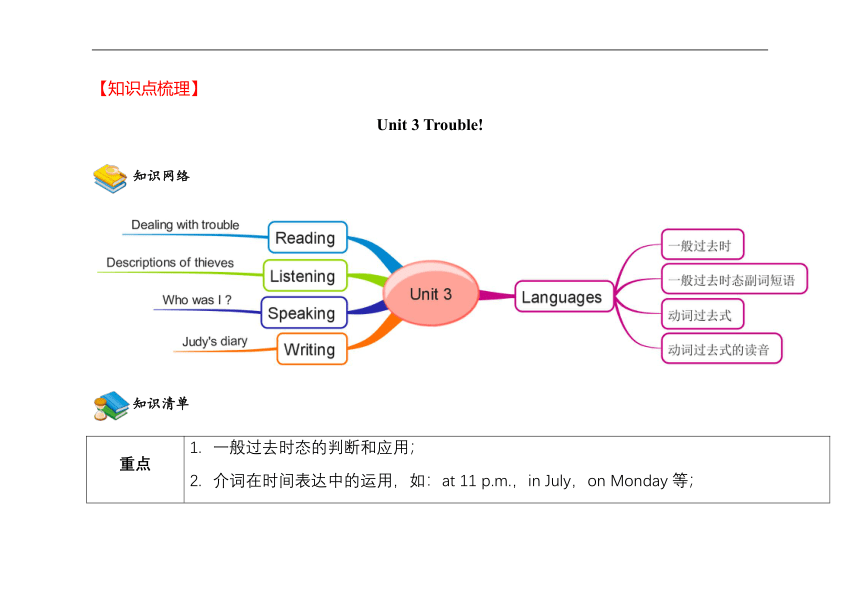
|
|
| 格式 | docx | ||
| 文件大小 | 246.1KB | ||
| 资源类型 | 教案 | ||
| 版本资源 | 牛津上海版(试用本) | ||
| 科目 | 英语 | ||
| 更新时间 | 2022-08-26 16:45:34 | ||
图片预览

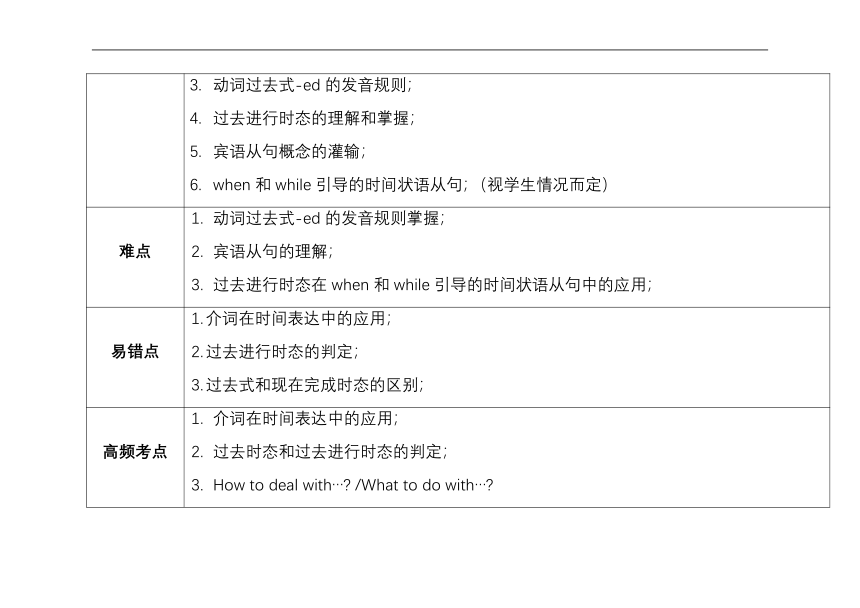
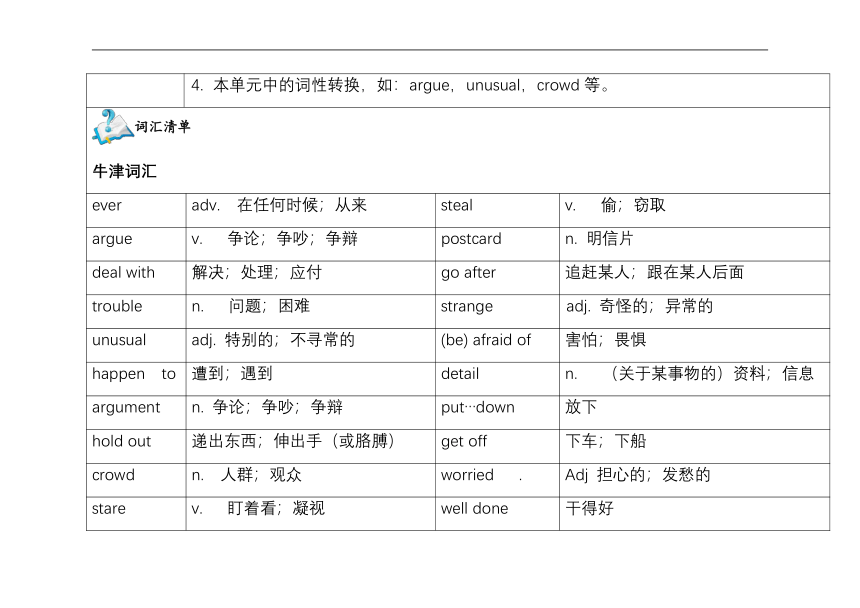
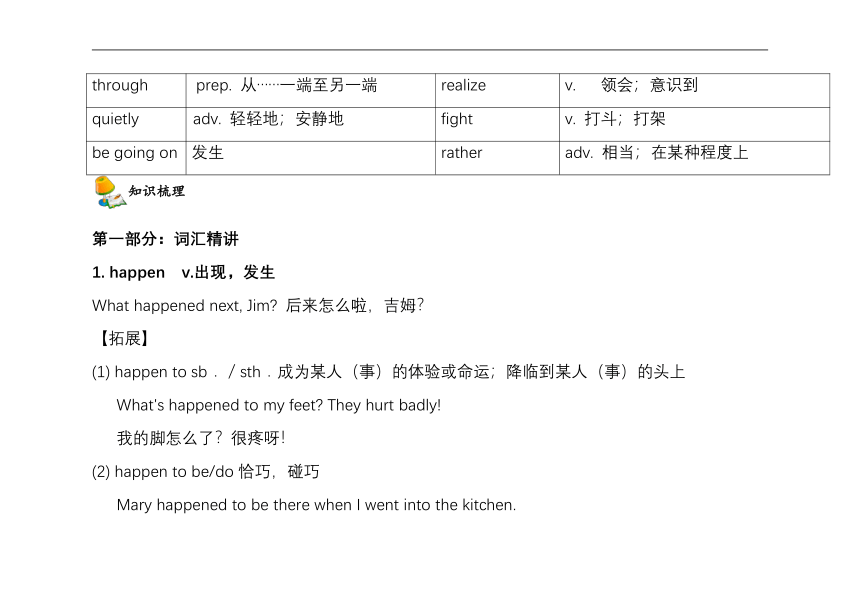
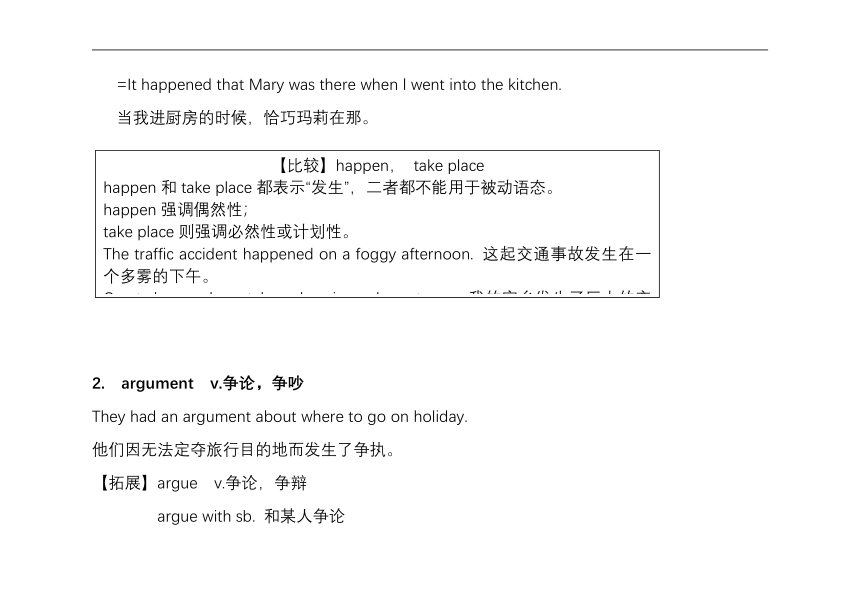
文档简介
【知识点梳理】
Unit 3 Trouble!
重点 一般过去时态的判断和应用; 介词在时间表达中的运用,如:at 11 p.m.,in July,on Monday等; 动词过去式-ed的发音规则; 过去进行时态的理解和掌握; 宾语从句概念的灌输; when和while引导的时间状语从句;(视学生情况而定)
难点 动词过去式-ed的发音规则掌握; 宾语从句的理解; 过去进行时态在when和while引导的时间状语从句中的应用;
易错点 介词在时间表达中的应用; 过去进行时态的判定; 过去式和现在完成时态的区别;
高频考点 介词在时间表达中的应用; 过去时态和过去进行时态的判定; How to deal with… /What to do with… 本单元中的词性转换,如:argue,unusual,crowd等。
牛津词汇
ever adv. 在任何时候;从来 steal v. 偷;窃取
argue v. 争论;争吵;争辩 postcard n. 明信片
deal with 解决;处理;应付 go after 追赶某人;跟在某人后面
trouble n. 问题;困难 strange adj. 奇怪的;异常的
unusual adj. 特别的;不寻常的 (be) afraid of 害怕;畏惧
happen to 遭到;遇到 detail n. (关于某事物的)资料;信息
argument n. 争论;争吵;争辩 put…down 放下
hold out 递出东西;伸出手(或胳膊) get off 下车;下船
crowd n. 人群;观众 worried . Adj 担心的;发愁的
stare v. 盯着看;凝视 well done 干得好
through prep. 从……一端至另一端 realize v. 领会;意识到
quietly adv. 轻轻地;安静地 fight v. 打斗;打架
be going on 发生 rather adv. 相当;在某种程度上
第一部分:词汇精讲
1. happen v.出现,发生
What happened next, Jim 后来怎么啦,吉姆?
【拓展】
(1) happen to sb./sth.成为某人(事)的体验或命运;降临到某人(事)的头上
What's happened to my feet They hurt badly!
我的脚怎么了?很疼呀!
(2) happen to be/do恰巧,碰巧
Mary happened to be there when I went into the kitchen.
=It happened that Mary was there when l went into the kitchen.
当我进厨房的时候,恰巧玛莉在那。
2. argument v.争论,争吵
They had an argument about where to go on holiday.
他们因无法定夺旅行目的地而发生了争执。
【拓展】argue v.争论,争辩
argue with sb. 和某人争论
3. hold
(l)vt.拿,握
He is holding the ladder for his father.
他在为他爸爸扶梯子。
(2)vt.容纳
The concert hall can hold 5,000 people.
这个音乐大厅能容纳5,000人。
(3)vt.举行;开会
They will hold the concert in the opera house.
他们将在歌剧院举行音乐会。
4. crowd n.人群
There is a large crowd at the football match.
足球赛场有一大群人。
【常用搭配】 a big crowd of people一大群人
【扩展】 crowded adj. 拥挤的
5. stare v.凝视,注视,盯
【拓展】stare at盯着,盯住
He stared at the word trying to remember what it meant.
他盯着这个单词,努力想记起它的意思。
6. through prep.
(l)穿过,通过
They drove through the tunnel.
他们开车穿过了隧道。
(2)从开始到结束,自始至终
They travelled through the night.
他们走了一整夜。
(3)因为
She got the job through her father.
她是通过她父亲而得到这份工作的。
(4)接通电话
Can you put me through to Jill Knight, please
劳驾,请吉尔·奈特接电话。
7. suddenly adv.突然地
Suddenly, it began to rain.
突然之间天就下雨了。
【拓展】sudden adj. 突然的,意外的 n. 突然,突然的事
8. notice v.注意到
Do you notice what he is wearing
你注意到他穿什么了吗?
【拓展】n. 警告,通知
【词组】notice sb. do sth 注意某人干好某事/notice sb. doing sth.注意某人正在干某事
I noticed him walk into the room.
=I noticed that he came into the room.
我注意到他进了房间。
I noticed him eating impolitely.
=I noticed that he was eating impolitely.
我注意到他正不礼貌地吃着。
【提示】see sb. do sth. 看到某人做好某事/see sb. doing sth.看到某人正在做某事
hear sb. do sth. 听到某人做好某事/hear sb. doing sth. 听到某人正在做某事
9. follow
(1) v. 跟随
Follow me and I'll show you the way.
跟着我,我给你指路。
(2) v. 领会;理解
I'm afraid I don't follow you.
对不起你讲的我没听懂。
【拓展】follower n.追随者;崇拜者 following adj.随后的
10. hurry v.急忙地(做),匆忙地(做)
She hurried across the rails in front of a train.
她匆匆地赶在一列火车前面穿过了铁轨。
【拓展】hurry n. 匆忙 in a hurry/hurriedly匆忙地
hurried adj. 匆忙的 hurriedly adv.匆忙地
【提示】do sth. in a hurry = hurry to do sth.
11. afraid adj.害怕,担心
I am afraid you are wrong about that.
这事儿我想恐怕是你错了。
【提示】 afraid只能用来作表语(即放在系动词之后),不能作定语。如果表示“一个担惊受怕的人”,应用a frightened person,不能用an afraid person。
12. theft n.偷,盗窃罪
What time did the theft take place
这起偷窃案发生在什么时候?
【拓展】thief n.小偷
【提示】rob vt. “抢劫,盗窃”, rob sb. of sth. 抢某人某物。
robber n.抢劫者 robbery n.抢劫案
第二部分:重点句型
1. Two women tourists and a young man were shouting at each other. 两名女游客和一名男青年在吵架。
【提示】women tourists 是woman tourist 的复数形式。我们可以用man或woman 修饰另一个名词来表明名词的性别,此时若要变为复数形式, 须将man 或woman与被修饰的名词一同变为复数形式。
如:a man driver 一个男司机 two men drivers 两个男司机
【对比】girl和boy 这两个词虽然也是表示性别的,但是在修饰名词时,一律用它们的单数形式。
如: a girl student 一个女学生 two girl students 两个女学生
过去进行时态 was/were doing sth. 过去正在做某事 过去进行时表示在过去的某一时间或时间段内正在发生的行为或动作,常与at seven last night,from three to five this afternoon,at that time,the whole morning等词组或用when和while引导的时间状语连用。 如 I was watching TV at eight last night. 昨天晚上八点我正在看电视。
2. Today my dad and I were waiting for the ferry… 今天我父亲和我正等渡轮…
3. …we heard a big argument, … 我们听见了一场大争论。
hear sb.doing sth.听到某人正在干某事
【提示】hear是感官动词,其后常跟不带to的动词不定式或现在分词作宾语补足语,即hear sb. do sth,或hear sb. doing sth.。
hear sb. do sth.意为“听到某人做了某事”,表示经常做某事或表示某个动作的全过程。
如: I heard him come into the classroom.
我听到他进了教室。
hear sb. doing sth.意为“听到某人正在做某事”,表示一个动作正在进行。
如: I hear someone reading in the classroom.
我听到有人正在教室里读书。
4. No one knew what was happening.没人知道发生了什么。
宾语从句 宾语从句在复合句中作主句的宾语。宾语从句的构成方式: 由that引导(that可以省略),从属连词that本身没有意义。 He knows she'll be back in a week. 他知道她一个星期之后将回来。 由连接代词或连接副词引导。 连接代词:what,whose,which,who 连接副词:when,where,why,how He asked who could answer the question.他问谁能回答这个问题。 由if/whether引导。 My mother asked if I had finished my homework.
第三部分:语法点拨
1. 一般过去时
(1) 在英语中,表示过去发生的动作或存在的状态要用一般过去时。一般过去时由动词的过去式构成,有三种形式:
The visitor visited the school yesterday.(肯定式)
He did not fight the robber.(否定式)
Did they find the purse (疑问式)
(2) 一般过去时的用法
1)表示过去某个特定时间发生的动作或存在的状态。
She suddenly fell ill yesterday.
她昨天突然病倒了。
We didn’t have classes last week.
上周我们没有上课。
2)表示过去的习惯性或经常发生的动作。
I went to the cinema once a week when I was at school.
我上学时每周去看一场电影。
When I was in the countryside, I often walked by the riverside.
我在乡下时经常在河边散步。
【提示】表示过去一段时间内经常或反复发生的动作,也可以用“would+动词原形”或用used to加动词原形。
When he was young, he would go skating every winter.
他年轻时每年冬天都要去滑冰。
Mrs Smith used to have a big house in downtown,
史密斯夫人在市中心曾经有一座大房子。
3)叙述过去连续发生的一件件事。
She got up early, fetched water, cleaned the room and then went out for a walk.
她早早起床、提水、打扫房间然后出去散步。
(3) 动词过去式构成
1)由动词原形加-ed构成: happen-happened, show-showed, start-started, follow-followed, open-opened, ask-asked, look-looked, walk-walked
2)以字母e结尾的直接加-d: move-moved,notice-noticed
3)以辅音字母加y结尾的变y为i加-ed:hurry-hurried, cry-cried(stay- stayed:元音字母加y结尾的直接加ed)
4)以“辅音字母+元音字母+辅音字母(w和y除外)”结尾,双写结尾的字母再加-ed: stop-stopped, prefer-preferred, travel-travelled
5)不变的:put-put,set- set,cost-cost,let-let
6)不规则的:am/is- was,are- were,hold-held,know--knew,say- said,run- ran,ring- rang,steal-stole, go-went, leave-left, give-gave, take- took, get-got, stand- stood
【记忆】:
一般过去时的形式:
a.was, were
b.肯定句:在动词后面加-ed或动词不规则变化
否定句:didn’t+动词原形
动词的不规则变化大体分为四类:
AAA类:cost, cost, cost ABA类:come, came, come
ABB类:get, got, got ABC类:fall, fell, fallen
2. 与一般过去时相关的时间短语
(1)一般过去时表示过去某个特定时间发生的动作或存在的状态时,这种情况常和just now, yesterday, last year,in 1999,two days ago等表示过去的时间状语连用。
一般过去时亦可与today,this week,this month,this year等表示现阶段的时间状语连用。
Did you meet him today
今天你看见他了吗?
(2)一般过去时表示过去经常或反复发生的动作时,常和often,always,once a week等表示频度的时间状语连用。
【经典例题】
【词汇篇】
例1.(★★)Mary really didn't know how to___________ the trouble by herself. A. do with B. dealt with C. deal with D. did with
【考点】how to deal with…/what to do with
【解析】“怎样处理、解决……”有两种表达方式,为固定搭配。本题中为how to……,所以应该选择deal with。
【答案】C
例2.(★★)Two days ago happened to the Browns. A. something usually B. unusually something C. unusual something D. something unusual
【考点】不定代词something等的用法
【解析】形容词修饰不定代词,应该放在不定代词的后面(口诀:“不行”——不定代词在前,形容词在后。)
【答案】D
例3.(★)The road is with buses and cars because of the traffic accident now. (crowd)
【考点】crowd/crowed的区别
【解析】crowded adj.拥挤的,crowd n.人群 “be crowded with………挤满了”
【答案】crowded
例4.(★)More and more people will flow into South Africa for the World Cup in the __________ month. (follow)
【考点】follow的衍生词following
【解析】follow v.跟随,following adj.接下来的。本题中修饰month,应该用形容词following。
【答案】following
例5.(★★★)Ten minutes ago, two men __________ reported a traffic accident on the highspeed road. (report)
【考点】report的衍生词reporter“记者”的用法。
【解析】“两个男记者报道了……”
【答案】reporters
例6.(★★★)James reported a __________ to the police last week, and the policemen caught the __________ yesterday. (rob)
【考点】rob的一系列衍生词的用法
【解析】“报告了一个……给警方”应该是抢劫案,所以填robbery,“警察抓住了……”应该是抢劫犯,所以填robber。
【答案】robbery,robber。
例7(★★)When I got into the classroom, Peter and Jackson were _________. (argument)
【考点】argue和argument
【解析】“当我进入教室的时候,彼得和杰克逊正在……”,由句意可以看出是过去进行时态,所以应该先将argument变为动词argue,再进行时态转变。
【答案】arguing
例8(★★)The _____speech made everyone in the hall sleepy. (bore)
【考点】boring和bored
【解析】bore的衍生词有boring和bored两种,本题中用来修饰speech,所以应该选形容词boring。
【答案】boring
【句型语法篇】
例9.(★★)There are more in my school than in yours. A. woman teachers B. women teachers C. women teacher D.woman teacher
【考点】woman和man修饰名词的用法
【解析】woman和man修饰名词变复数后,都应该变为复数,但是girl和boy修饰名词则不需要变复数。
【答案】B
例10.(★)We some postcards for our friends last week. A. to buy B. buy C. buying D. bought
【考点】一般过去时态
【解析】本题中last week“上星期”为典型的过去时态时间状语,所以应该用过去时态。
【答案】D
例11.(★★★)Nobody noticed Tom the Bank of Shanghai. A. entered B. to enter C. enters D. enter
【考点】notice sb. do sth./notice sb. doing sth.
【解析】由notice的用法可以看出,本题应该选择动词原形enter。
【答案】D
【能力篇】
例12.(★★★)Jack and I ______ (not be) in the same school though we are neighbours. He always______ (walk) to school at 6:30 a. m. I______ (not have) to go to school so early because my school______ (not be) far from my home. Yesterday afternoon, Jack______ (enter) the Pizza Palace near our school. I______ (be) there, too. We______ (see) a daring pizza robbery there. We______ (not believe) our eyes at that time. 【答案】aren’t walks don’t have isn’t entered was saw didn’t believe
【课堂小结】
【教学建议】
本单元的语法点为一般过去时态,但是不能忽略文章中已经出现的过去进行时态和宾语从句,应该适当开始为学生穿插讲解过去进行时态和宾语从句的语法。
一、词汇:
1、主要词组:
wait for(等待) each other(互相) hold out(递出东西,伸出手) stare at(盯着……看) be going on(发生) run away(逃跑) go after(追赶) be afraid of(害怕,畏惧) pick up(拿起,捡起) put…down(放下) get off(下车,下船) see…doing(看到……正在做) deal with(解决,处理) catch one’s notice(引起某人的注意) shout at(冲……嚷嚷,冲……喊叫)
2、词语变换:
argue→(名词)argument unusual→(反义词)usual→(副词)usually crowd→(形容词)crowed quietly→(形容词)quiet worried→(动词)worry realize→(形容词)→ real (副词)→really fight→ (名词)fighter downstairs→(反义词)upstairs
二、句型:
Paul is writing about an unusual thing that happened to him one day. (保罗正在写某天发生在他身上的一件不同寻常的事情。)
Today my dad and I were waiting for the ferry when suddenly we heard a big argument. (今天,当我和爸爸在等渡轮的时候,突然听到了一阵很大的争执声。)
The man held out a bag, and showed everyone that it was empty. (男青年双手递出一只包,向周围的人展示它是空的。)
Suddenly my friend noticed that her purse was gone. (突然,我的朋友注意到她的皮夹不见了。)
Was my dad afraid of that man (我爸爸害怕那个人吗?)
Unit 3 Trouble!
重点 一般过去时态的判断和应用; 介词在时间表达中的运用,如:at 11 p.m.,in July,on Monday等; 动词过去式-ed的发音规则; 过去进行时态的理解和掌握; 宾语从句概念的灌输; when和while引导的时间状语从句;(视学生情况而定)
难点 动词过去式-ed的发音规则掌握; 宾语从句的理解; 过去进行时态在when和while引导的时间状语从句中的应用;
易错点 介词在时间表达中的应用; 过去进行时态的判定; 过去式和现在完成时态的区别;
高频考点 介词在时间表达中的应用; 过去时态和过去进行时态的判定; How to deal with… /What to do with… 本单元中的词性转换,如:argue,unusual,crowd等。
牛津词汇
ever adv. 在任何时候;从来 steal v. 偷;窃取
argue v. 争论;争吵;争辩 postcard n. 明信片
deal with 解决;处理;应付 go after 追赶某人;跟在某人后面
trouble n. 问题;困难 strange adj. 奇怪的;异常的
unusual adj. 特别的;不寻常的 (be) afraid of 害怕;畏惧
happen to 遭到;遇到 detail n. (关于某事物的)资料;信息
argument n. 争论;争吵;争辩 put…down 放下
hold out 递出东西;伸出手(或胳膊) get off 下车;下船
crowd n. 人群;观众 worried . Adj 担心的;发愁的
stare v. 盯着看;凝视 well done 干得好
through prep. 从……一端至另一端 realize v. 领会;意识到
quietly adv. 轻轻地;安静地 fight v. 打斗;打架
be going on 发生 rather adv. 相当;在某种程度上
第一部分:词汇精讲
1. happen v.出现,发生
What happened next, Jim 后来怎么啦,吉姆?
【拓展】
(1) happen to sb./sth.成为某人(事)的体验或命运;降临到某人(事)的头上
What's happened to my feet They hurt badly!
我的脚怎么了?很疼呀!
(2) happen to be/do恰巧,碰巧
Mary happened to be there when I went into the kitchen.
=It happened that Mary was there when l went into the kitchen.
当我进厨房的时候,恰巧玛莉在那。
2. argument v.争论,争吵
They had an argument about where to go on holiday.
他们因无法定夺旅行目的地而发生了争执。
【拓展】argue v.争论,争辩
argue with sb. 和某人争论
3. hold
(l)vt.拿,握
He is holding the ladder for his father.
他在为他爸爸扶梯子。
(2)vt.容纳
The concert hall can hold 5,000 people.
这个音乐大厅能容纳5,000人。
(3)vt.举行;开会
They will hold the concert in the opera house.
他们将在歌剧院举行音乐会。
4. crowd n.人群
There is a large crowd at the football match.
足球赛场有一大群人。
【常用搭配】 a big crowd of people一大群人
【扩展】 crowded adj. 拥挤的
5. stare v.凝视,注视,盯
【拓展】stare at盯着,盯住
He stared at the word trying to remember what it meant.
他盯着这个单词,努力想记起它的意思。
6. through prep.
(l)穿过,通过
They drove through the tunnel.
他们开车穿过了隧道。
(2)从开始到结束,自始至终
They travelled through the night.
他们走了一整夜。
(3)因为
She got the job through her father.
她是通过她父亲而得到这份工作的。
(4)接通电话
Can you put me through to Jill Knight, please
劳驾,请吉尔·奈特接电话。
7. suddenly adv.突然地
Suddenly, it began to rain.
突然之间天就下雨了。
【拓展】sudden adj. 突然的,意外的 n. 突然,突然的事
8. notice v.注意到
Do you notice what he is wearing
你注意到他穿什么了吗?
【拓展】n. 警告,通知
【词组】notice sb. do sth 注意某人干好某事/notice sb. doing sth.注意某人正在干某事
I noticed him walk into the room.
=I noticed that he came into the room.
我注意到他进了房间。
I noticed him eating impolitely.
=I noticed that he was eating impolitely.
我注意到他正不礼貌地吃着。
【提示】see sb. do sth. 看到某人做好某事/see sb. doing sth.看到某人正在做某事
hear sb. do sth. 听到某人做好某事/hear sb. doing sth. 听到某人正在做某事
9. follow
(1) v. 跟随
Follow me and I'll show you the way.
跟着我,我给你指路。
(2) v. 领会;理解
I'm afraid I don't follow you.
对不起你讲的我没听懂。
【拓展】follower n.追随者;崇拜者 following adj.随后的
10. hurry v.急忙地(做),匆忙地(做)
She hurried across the rails in front of a train.
她匆匆地赶在一列火车前面穿过了铁轨。
【拓展】hurry n. 匆忙 in a hurry/hurriedly匆忙地
hurried adj. 匆忙的 hurriedly adv.匆忙地
【提示】do sth. in a hurry = hurry to do sth.
11. afraid adj.害怕,担心
I am afraid you are wrong about that.
这事儿我想恐怕是你错了。
【提示】 afraid只能用来作表语(即放在系动词之后),不能作定语。如果表示“一个担惊受怕的人”,应用a frightened person,不能用an afraid person。
12. theft n.偷,盗窃罪
What time did the theft take place
这起偷窃案发生在什么时候?
【拓展】thief n.小偷
【提示】rob vt. “抢劫,盗窃”, rob sb. of sth. 抢某人某物。
robber n.抢劫者 robbery n.抢劫案
第二部分:重点句型
1. Two women tourists and a young man were shouting at each other. 两名女游客和一名男青年在吵架。
【提示】women tourists 是woman tourist 的复数形式。我们可以用man或woman 修饰另一个名词来表明名词的性别,此时若要变为复数形式, 须将man 或woman与被修饰的名词一同变为复数形式。
如:a man driver 一个男司机 two men drivers 两个男司机
【对比】girl和boy 这两个词虽然也是表示性别的,但是在修饰名词时,一律用它们的单数形式。
如: a girl student 一个女学生 two girl students 两个女学生
过去进行时态 was/were doing sth. 过去正在做某事 过去进行时表示在过去的某一时间或时间段内正在发生的行为或动作,常与at seven last night,from three to five this afternoon,at that time,the whole morning等词组或用when和while引导的时间状语连用。 如 I was watching TV at eight last night. 昨天晚上八点我正在看电视。
2. Today my dad and I were waiting for the ferry… 今天我父亲和我正等渡轮…
3. …we heard a big argument, … 我们听见了一场大争论。
hear sb.doing sth.听到某人正在干某事
【提示】hear是感官动词,其后常跟不带to的动词不定式或现在分词作宾语补足语,即hear sb. do sth,或hear sb. doing sth.。
hear sb. do sth.意为“听到某人做了某事”,表示经常做某事或表示某个动作的全过程。
如: I heard him come into the classroom.
我听到他进了教室。
hear sb. doing sth.意为“听到某人正在做某事”,表示一个动作正在进行。
如: I hear someone reading in the classroom.
我听到有人正在教室里读书。
4. No one knew what was happening.没人知道发生了什么。
宾语从句 宾语从句在复合句中作主句的宾语。宾语从句的构成方式: 由that引导(that可以省略),从属连词that本身没有意义。 He knows she'll be back in a week. 他知道她一个星期之后将回来。 由连接代词或连接副词引导。 连接代词:what,whose,which,who 连接副词:when,where,why,how He asked who could answer the question.他问谁能回答这个问题。 由if/whether引导。 My mother asked if I had finished my homework.
第三部分:语法点拨
1. 一般过去时
(1) 在英语中,表示过去发生的动作或存在的状态要用一般过去时。一般过去时由动词的过去式构成,有三种形式:
The visitor visited the school yesterday.(肯定式)
He did not fight the robber.(否定式)
Did they find the purse (疑问式)
(2) 一般过去时的用法
1)表示过去某个特定时间发生的动作或存在的状态。
She suddenly fell ill yesterday.
她昨天突然病倒了。
We didn’t have classes last week.
上周我们没有上课。
2)表示过去的习惯性或经常发生的动作。
I went to the cinema once a week when I was at school.
我上学时每周去看一场电影。
When I was in the countryside, I often walked by the riverside.
我在乡下时经常在河边散步。
【提示】表示过去一段时间内经常或反复发生的动作,也可以用“would+动词原形”或用used to加动词原形。
When he was young, he would go skating every winter.
他年轻时每年冬天都要去滑冰。
Mrs Smith used to have a big house in downtown,
史密斯夫人在市中心曾经有一座大房子。
3)叙述过去连续发生的一件件事。
She got up early, fetched water, cleaned the room and then went out for a walk.
她早早起床、提水、打扫房间然后出去散步。
(3) 动词过去式构成
1)由动词原形加-ed构成: happen-happened, show-showed, start-started, follow-followed, open-opened, ask-asked, look-looked, walk-walked
2)以字母e结尾的直接加-d: move-moved,notice-noticed
3)以辅音字母加y结尾的变y为i加-ed:hurry-hurried, cry-cried(stay- stayed:元音字母加y结尾的直接加ed)
4)以“辅音字母+元音字母+辅音字母(w和y除外)”结尾,双写结尾的字母再加-ed: stop-stopped, prefer-preferred, travel-travelled
5)不变的:put-put,set- set,cost-cost,let-let
6)不规则的:am/is- was,are- were,hold-held,know--knew,say- said,run- ran,ring- rang,steal-stole, go-went, leave-left, give-gave, take- took, get-got, stand- stood
【记忆】:
一般过去时的形式:
a.was, were
b.肯定句:在动词后面加-ed或动词不规则变化
否定句:didn’t+动词原形
动词的不规则变化大体分为四类:
AAA类:cost, cost, cost ABA类:come, came, come
ABB类:get, got, got ABC类:fall, fell, fallen
2. 与一般过去时相关的时间短语
(1)一般过去时表示过去某个特定时间发生的动作或存在的状态时,这种情况常和just now, yesterday, last year,in 1999,two days ago等表示过去的时间状语连用。
一般过去时亦可与today,this week,this month,this year等表示现阶段的时间状语连用。
Did you meet him today
今天你看见他了吗?
(2)一般过去时表示过去经常或反复发生的动作时,常和often,always,once a week等表示频度的时间状语连用。
【经典例题】
【词汇篇】
例1.(★★)Mary really didn't know how to___________ the trouble by herself. A. do with B. dealt with C. deal with D. did with
【考点】how to deal with…/what to do with
【解析】“怎样处理、解决……”有两种表达方式,为固定搭配。本题中为how to……,所以应该选择deal with。
【答案】C
例2.(★★)Two days ago happened to the Browns. A. something usually B. unusually something C. unusual something D. something unusual
【考点】不定代词something等的用法
【解析】形容词修饰不定代词,应该放在不定代词的后面(口诀:“不行”——不定代词在前,形容词在后。)
【答案】D
例3.(★)The road is with buses and cars because of the traffic accident now. (crowd)
【考点】crowd/crowed的区别
【解析】crowded adj.拥挤的,crowd n.人群 “be crowded with………挤满了”
【答案】crowded
例4.(★)More and more people will flow into South Africa for the World Cup in the __________ month. (follow)
【考点】follow的衍生词following
【解析】follow v.跟随,following adj.接下来的。本题中修饰month,应该用形容词following。
【答案】following
例5.(★★★)Ten minutes ago, two men __________ reported a traffic accident on the highspeed road. (report)
【考点】report的衍生词reporter“记者”的用法。
【解析】“两个男记者报道了……”
【答案】reporters
例6.(★★★)James reported a __________ to the police last week, and the policemen caught the __________ yesterday. (rob)
【考点】rob的一系列衍生词的用法
【解析】“报告了一个……给警方”应该是抢劫案,所以填robbery,“警察抓住了……”应该是抢劫犯,所以填robber。
【答案】robbery,robber。
例7(★★)When I got into the classroom, Peter and Jackson were _________. (argument)
【考点】argue和argument
【解析】“当我进入教室的时候,彼得和杰克逊正在……”,由句意可以看出是过去进行时态,所以应该先将argument变为动词argue,再进行时态转变。
【答案】arguing
例8(★★)The _____speech made everyone in the hall sleepy. (bore)
【考点】boring和bored
【解析】bore的衍生词有boring和bored两种,本题中用来修饰speech,所以应该选形容词boring。
【答案】boring
【句型语法篇】
例9.(★★)There are more in my school than in yours. A. woman teachers B. women teachers C. women teacher D.woman teacher
【考点】woman和man修饰名词的用法
【解析】woman和man修饰名词变复数后,都应该变为复数,但是girl和boy修饰名词则不需要变复数。
【答案】B
例10.(★)We some postcards for our friends last week. A. to buy B. buy C. buying D. bought
【考点】一般过去时态
【解析】本题中last week“上星期”为典型的过去时态时间状语,所以应该用过去时态。
【答案】D
例11.(★★★)Nobody noticed Tom the Bank of Shanghai. A. entered B. to enter C. enters D. enter
【考点】notice sb. do sth./notice sb. doing sth.
【解析】由notice的用法可以看出,本题应该选择动词原形enter。
【答案】D
【能力篇】
例12.(★★★)Jack and I ______ (not be) in the same school though we are neighbours. He always______ (walk) to school at 6:30 a. m. I______ (not have) to go to school so early because my school______ (not be) far from my home. Yesterday afternoon, Jack______ (enter) the Pizza Palace near our school. I______ (be) there, too. We______ (see) a daring pizza robbery there. We______ (not believe) our eyes at that time. 【答案】aren’t walks don’t have isn’t entered was saw didn’t believe
【课堂小结】
【教学建议】
本单元的语法点为一般过去时态,但是不能忽略文章中已经出现的过去进行时态和宾语从句,应该适当开始为学生穿插讲解过去进行时态和宾语从句的语法。
一、词汇:
1、主要词组:
wait for(等待) each other(互相) hold out(递出东西,伸出手) stare at(盯着……看) be going on(发生) run away(逃跑) go after(追赶) be afraid of(害怕,畏惧) pick up(拿起,捡起) put…down(放下) get off(下车,下船) see…doing(看到……正在做) deal with(解决,处理) catch one’s notice(引起某人的注意) shout at(冲……嚷嚷,冲……喊叫)
2、词语变换:
argue→(名词)argument unusual→(反义词)usual→(副词)usually crowd→(形容词)crowed quietly→(形容词)quiet worried→(动词)worry realize→(形容词)→ real (副词)→really fight→ (名词)fighter downstairs→(反义词)upstairs
二、句型:
Paul is writing about an unusual thing that happened to him one day. (保罗正在写某天发生在他身上的一件不同寻常的事情。)
Today my dad and I were waiting for the ferry when suddenly we heard a big argument. (今天,当我和爸爸在等渡轮的时候,突然听到了一阵很大的争执声。)
The man held out a bag, and showed everyone that it was empty. (男青年双手递出一只包,向周围的人展示它是空的。)
Suddenly my friend noticed that her purse was gone. (突然,我的朋友注意到她的皮夹不见了。)
Was my dad afraid of that man (我爸爸害怕那个人吗?)
